
Earl Granville is a title that has been created twice, once in the Peerage of Great Britain and once in the Peerage of the United Kingdom. It is now held by members of the Leveson-Gower family.

Earl of Cromer is a title in the Peerage of the United Kingdom, held by members of the British branch of the Anglo-German Baring banking family.
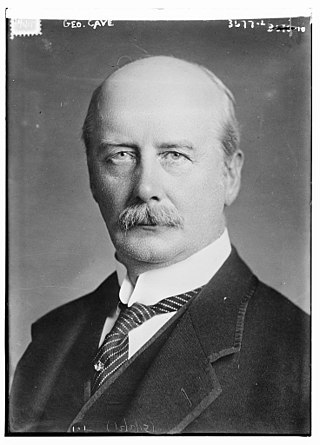
George Cave, 1st Viscount Cave, was a British lawyer and Conservative politician. He was Home Secretary under David Lloyd George from 1916 to 1919 and served as Lord Chancellor from 1922 to 1924 and again from 1924 to 1928.
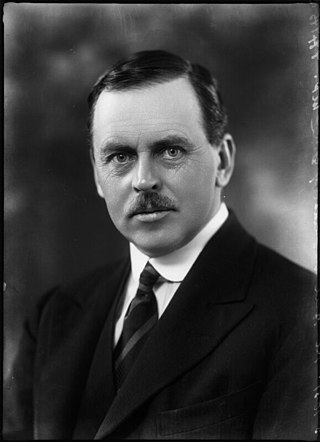
William George Arthur Ormsby-Gore, 4th Baron Harlech,, was a British Conservative politician and banker.

Robert Munro, 1st Baron Alness,, was a Scottish lawyer, judge and Liberal politician. He served as Secretary for Scotland between 1916 and 1922 in David Lloyd George's coalition government and as Lord Justice Clerk between 1922 and 1933.
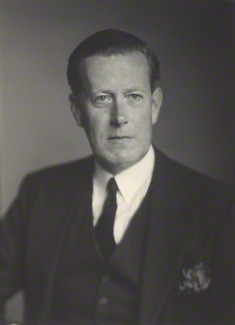
Victor Alexander George Anthony Warrender, 1st Baron Bruntisfield, known as Sir Victor Warrender, Bt, between 1917 and 1942, was a British Conservative politician. He held minor political offices between 1928 and 1945, notably as Parliamentary and Financial Secretary to the Admiralty from 1940 to 1945 in Winston Churchill's war-time coalition government. In 1942 he was ennobled as Baron Bruntisfield. He is also said to be the first politician Margaret Thatcher looked up to before beginning her career in politics.
Baron Ebbisham, of Cobham in the County of Surrey, was a title in the Peerage of the United Kingdom. It was created on 5 July 1928 for the businessman and Conservative politician Sir Rowland Blades, 1st Baronet. He had already been created a Baronet, of Epsom in the County of Surrey, in the Baronetage of the United Kingdom on 14 January 1922. The titles became extinct upon the death of his son, the second Baron, in 1991.

George John Shaw Lefevre, 1st Baron Eversley was a British Liberal Party politician. In a ministerial career that spanned thirty years, he was twice First Commissioner of Works and also served as Postmaster General and President of the Local Government Board.
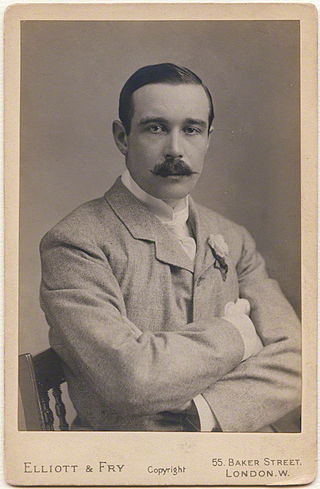
James Henry Dalziel, 1st Baron Dalziel of Kirkcaldy, PC, known as Sir Henry Dalziel, Bt, between 1918 and 1921, was a British newspaper proprietor, Liberal politician and supporter of David Lloyd George.

George Richard James Hennessy, 1st Baron Windlesham, OBE was a British soldier and Conservative politician.

Arthur Michael Samuel, 1st Baron Mancroft was a British Conservative politician.
Martin Henry FitzPatrick Morris, 2nd Baron Killanin, PC(Ire) was an Irish Unionist (Conservative) Member of Parliament (MP).

George Ralph Charles Ormsby-Gore, 3rd Baron Harlech,, was a British soldier and Conservative Member of Parliament.

John Andrew Hamilton, 1st Viscount Sumner, was a British lawyer and judge. He was appointed a judge of the High Court of Justice in 1909, a Lord Justice of Appeal in 1912 and a Lord of Appeal in Ordinary in 1913. Created a life peer as Baron Sumner in 1913, he was further honoured when he was granted a hereditary peerage as Viscount Sumner in 1927.
Major Ralph George Campbell Glyn, 1st Baron Glyn, Bt, MC, DL, known as Sir Ralph Glyn, 1st Baronet, from 1934 to 1953, was a soldier and Conservative Party politician in the United Kingdom. He was a Member of Parliament (MP) from 1918 to 1922, and from 1924 to 1953.

Frank Boyd Merriman, 1st Baron Merriman of Knutsford,, known as Boyd Merriman, was a British Conservative politician and judge.
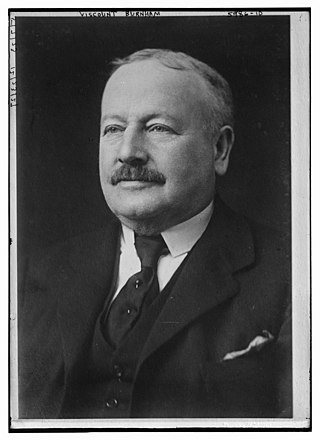
Harry Lawson Webster Levy-Lawson, 1st Viscount Burnham,, was a British newspaper proprietor. He was originally a Liberal politician before joining the Liberal Unionist Party in the late 1890s. He sat in the House of Commons 1885–1892, 1893–1895, 1905–1906 and 1910–1916 until he inherited the Burnham barony on the death of his father.
Charles Ernest Leonard Lyle, 1st Baron Lyle of Westbourne was a British industrialist and Conservative Party politician.
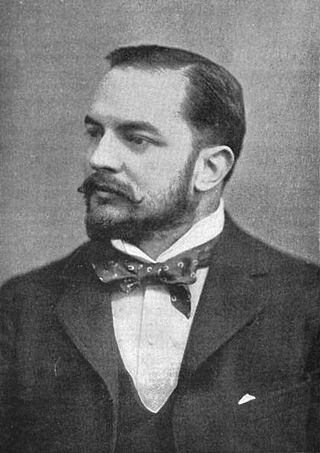
Thomas Robert Dewar, 1st Baron Dewar was a Scottish whisky distiller who, along with his brother John Dewar, built their family company John Dewar & Sons into an international success. They blended their whisky to make it more appealing to the international palate and Dewar demonstrated particular skills in marketing, travelling the world to find new markets and promote his product, exploiting romantic images of Scotland and tartan in his advertising.

George Ranken Askwith, 1st Baron Askwith, KCB, KC, known as Sir George Askwith between 1911 and 1919, was an English lawyer, civil servant and industrial arbitrator.

















